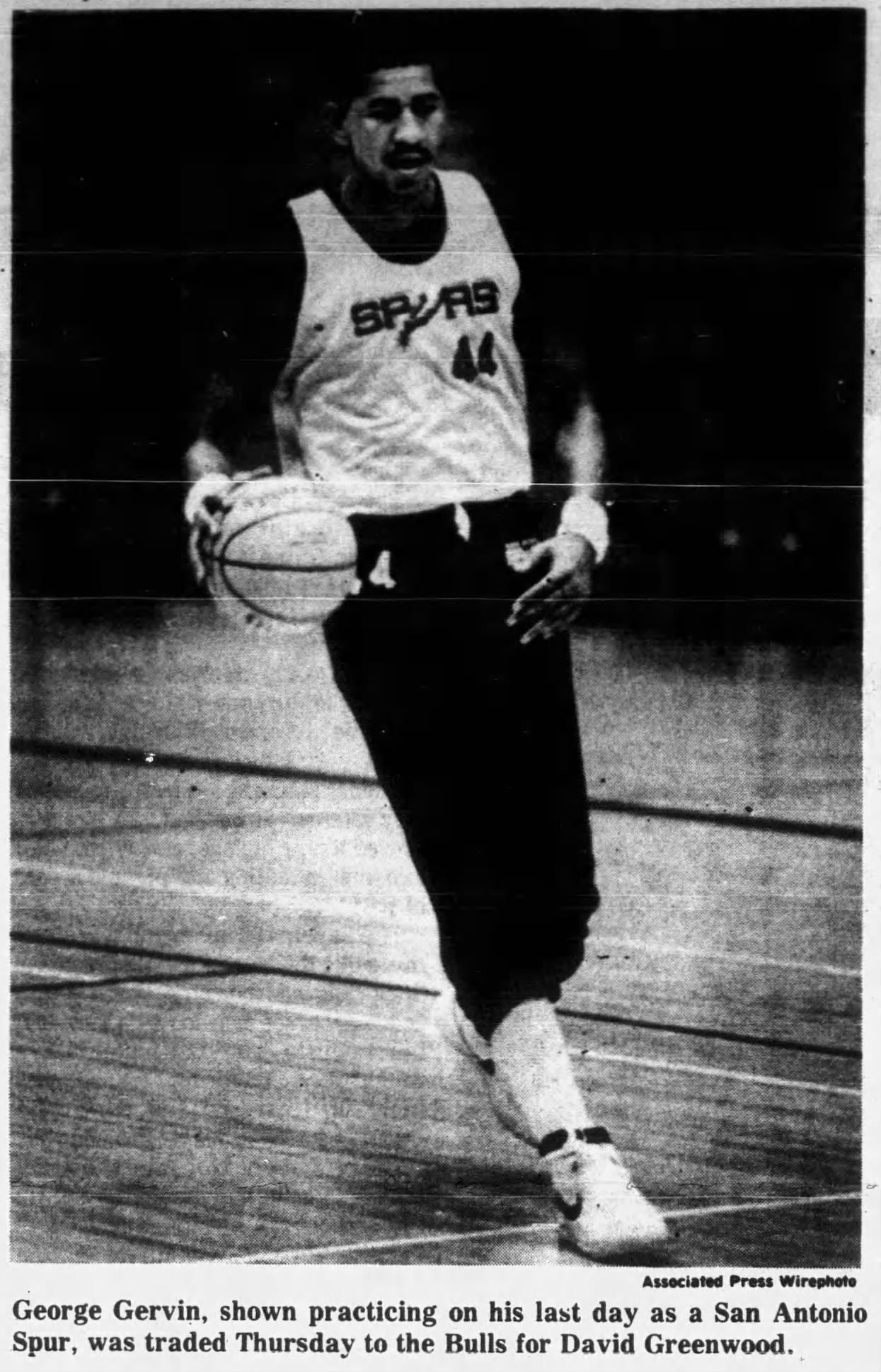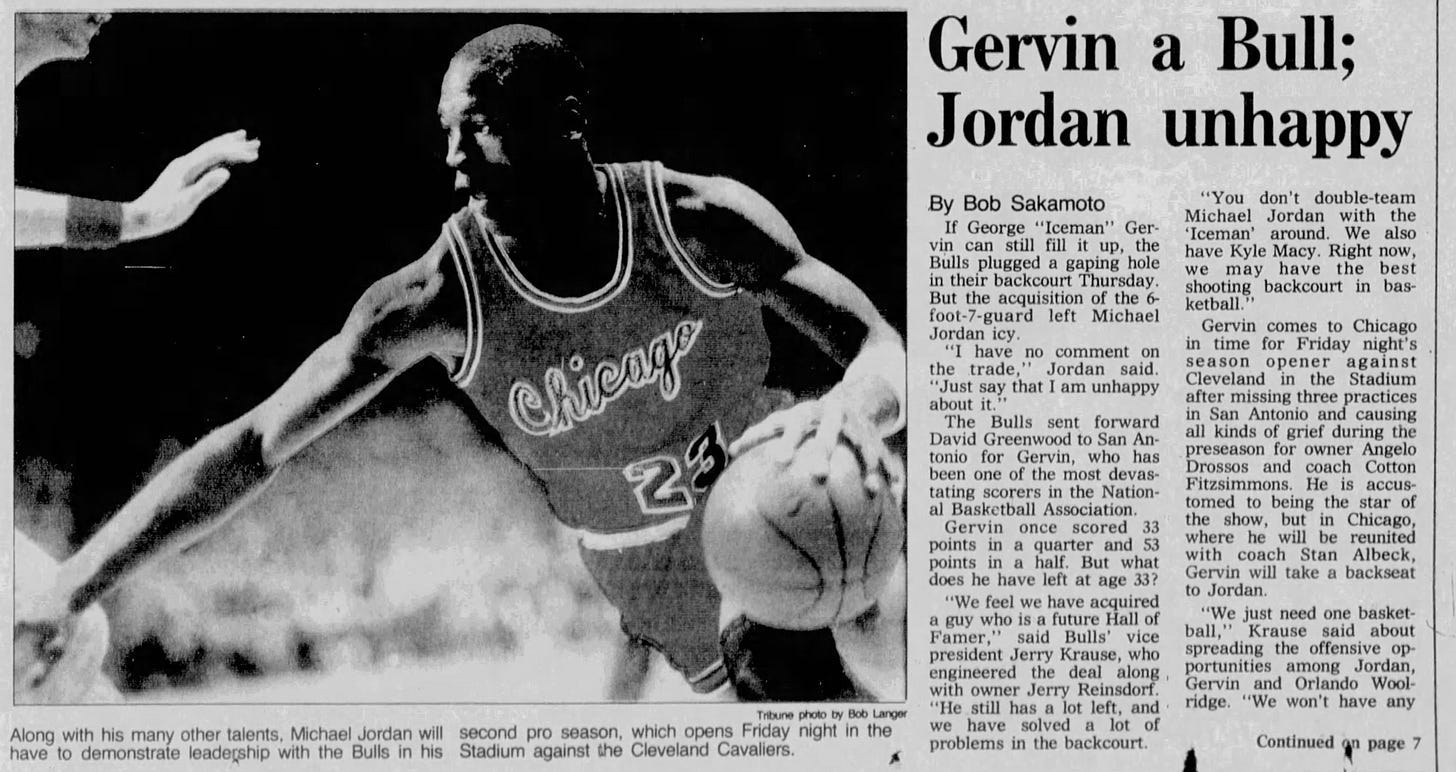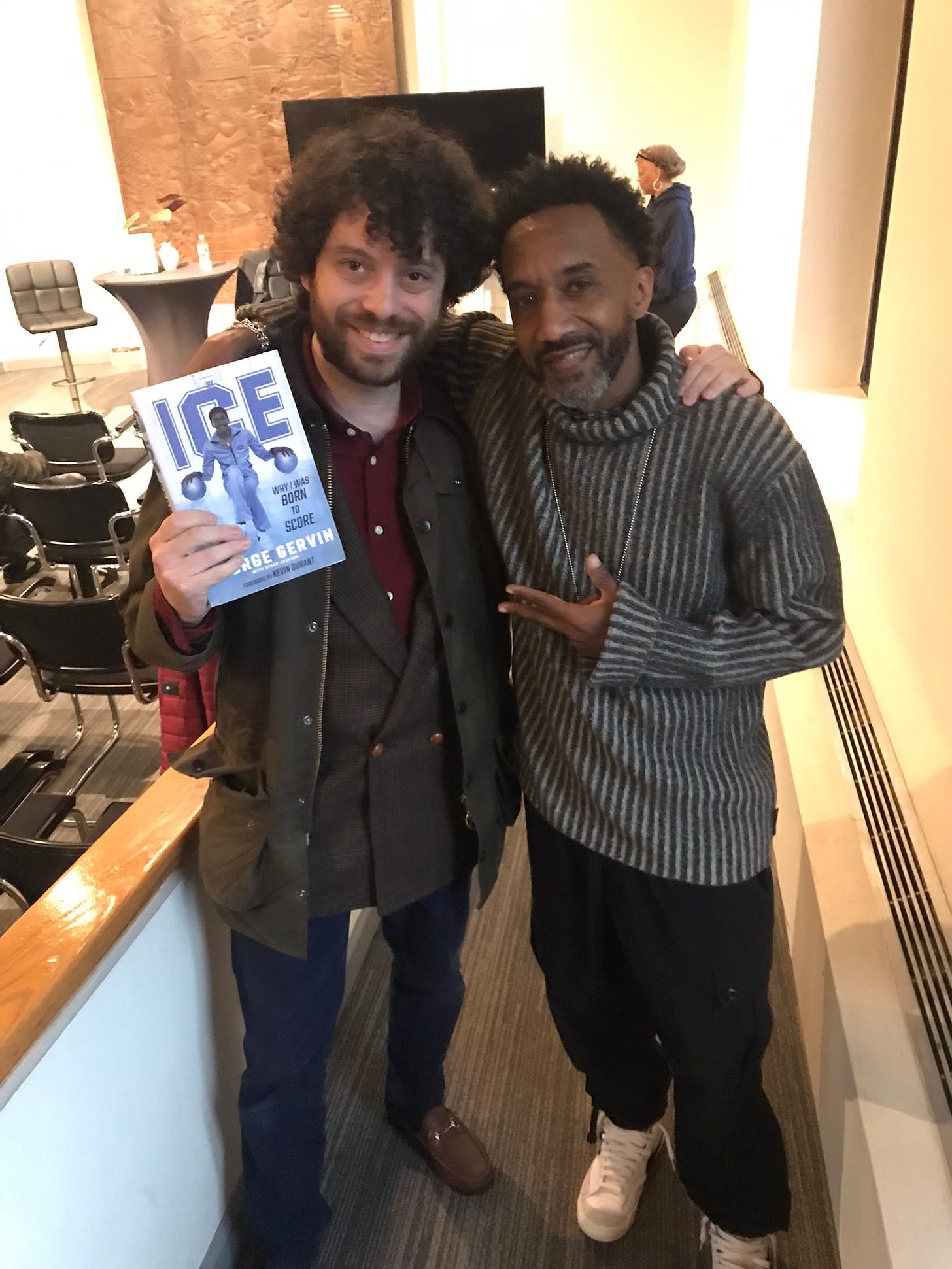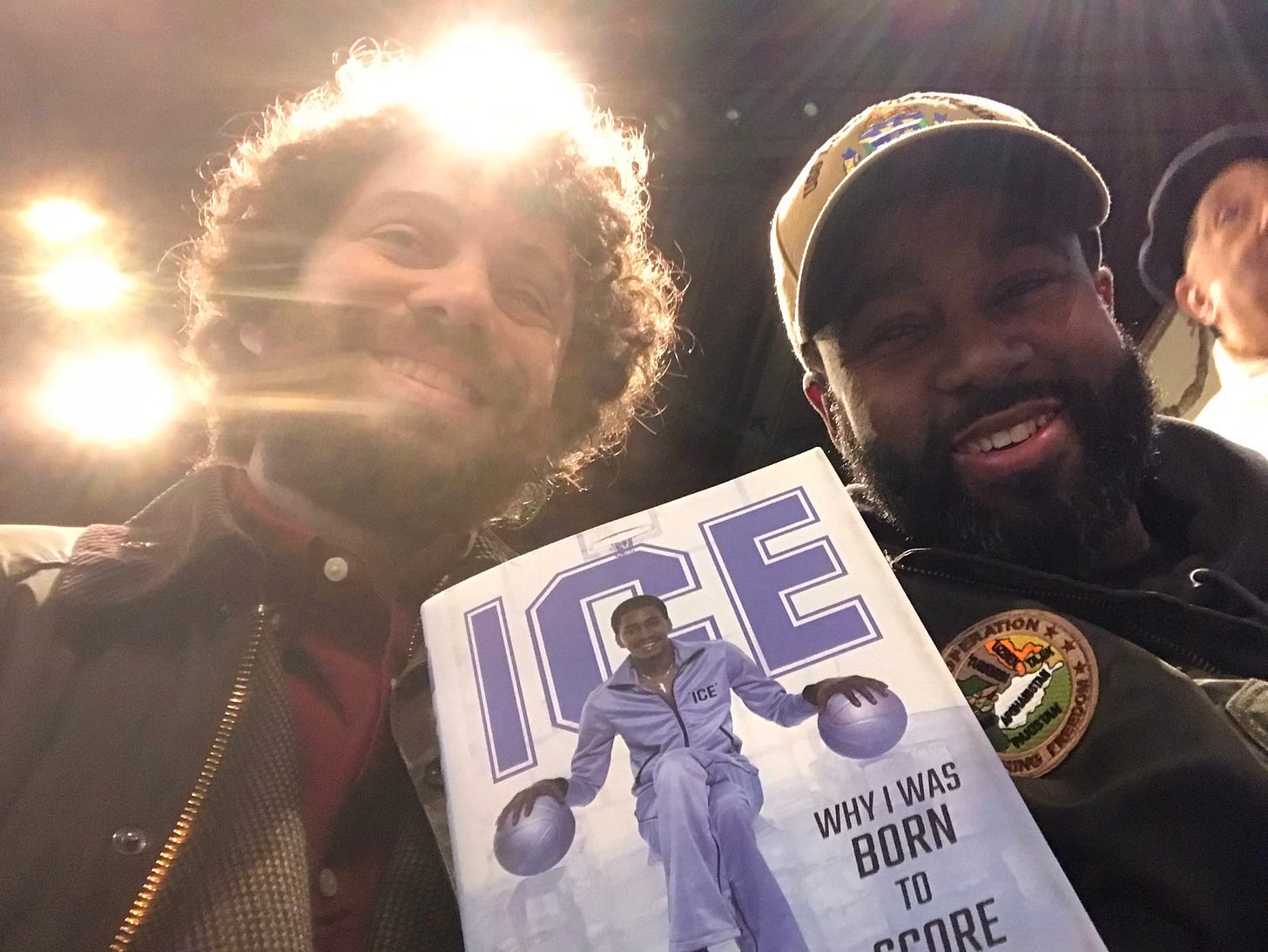George Gervin on MJ's 63-point game: "I knew my time was up."
In his new memoir with Scoop Jackson, the Iceman discusses joining the Bulls for 1986 and playing his final NBA game: when Michael Jordan scored 63 points.

“You don’t double-team Michael Jordan with the ‘Iceman’ around.”
— Bulls GM Jerry Krause upon trading for Spurs legend George Gervin, Oct. 24, 1985
63 points.
You know what it means.
Even today, even with The Shot and The Shrug and The Flu Game and The Last Shot, Michael Jordan dropping a playoff-record 63 at Boston Garden against the invincible Celtics remains arguably his most memorable performance.
What I never truly considered until last month was that game’s other significance in NBA history: It was the final NBA game of Hall of Fame legend George Gervin.
“I think about the final NBA game I actually played in — Game Two versus the Boston Celtics in the playoff game where Michael Jordan famously scored 63 points,” Gervin writes in Ice: Why I Was Born to Score, his new memoir co-written by the great Scoop Jackson. “I thought about my career during that game and how I used to put the ball in the basket and scored in all different kind of ways, and to watch young Jordan, who was doing it in a different, athletic way, really opened my eyes about being able to walk away from the game gracefully.”
Throughout his memoir, Gervin speaks with candor, humor and humility, including his frustration that led to him forcing a trade off of his beloved San Antonio Spurs. Gervin history was Spurs history. He joined the club at 21, his second season and the franchise’s first in San Antonio, back with the ABA. The Iceman became the face of the franchise, bagging four scoring titles while leading the Spurs to three conference finals.
In the ‘85-’86 preseason, a contract dispute led Gervin to force Spurs owner Angelo Drossos to trade him.
“Drossos told me at that time, ‘Man, just retire, and I’ll give you half of your money this year and the other half next year,’” Gervin writes. “He made it very attractive, but … I wasn’t ready to hang it up. I saw the finish line and I wasn’t ready to cross it. Wasn’t ready to face it. So I ended up going to Chicago.”
Instead, the finish line came to him.
“I ran into that buzzsaw named Michael Jordan.”
After just his rookie year, Michael Jordan was a full-blown superstar. Entering the ‘86 season, one New York sportswriter named Jordan one of the NBA’s five best players, along with two-time reigning MVP Larry Bird, two-time NBA Finals MVP and reigning NBA champion Magic Johnson, six-time NBA MVP and reigning NBA Finals MVP Kareem Abdul-Jabbar and 1985 All-NBA forward Terry Cummings, who in the ‘85 playoffs out-scored Jordan by a single point across the four-game series, the only time that any player would outscore Jordan in a playoff series for the rest of his career.
“I was glad to retire from the NBA because I’d had my turn. But then I ran into that buzzsaw named Michael Jordan, and he was so good,” Gervin writes in Ice. “His potential was scary. How he practiced was scary. He played like he practiced and he practiced like he played.”
For his part, Jordan was succinct in his reaction to the trade, which sent former Bulls #1 pick Dave Greenwood to the Spurs.
“I have no comment on the trade — just say that I am unhappy about it,” MJ said when the trade was announced.
Jordan surely was reacting in part to the All-Star Game the season before in Indianapolis, when the Chicago Tribune and Detroit Free Press reported that several All-Stars conspired to “freeze out” the rookie Jordan. The supposed ringleader was Jordan’s fellow East starting guard Isiah Thomas, joined by West starting guards Gervin and Magic Johnson.
Gervin was only a side character in the freeze-out story. An advisor to Isiah and Magic named Dr. Charles Tucker told reporters that veterans wanted to embarrass Jordan because of his “attitude problem.” The East All-Stars apparently were going to keep the ball out of Jordan’s hands and then not help him defend Gervin.
The Detroit Free Press reported that at the Indianapolis airport after the game, Tucker, Isiah and Gervin spoke briefly and then “broke into gales of laughter.” “We were talking about how good they got Jordan,” Tucker said.1
Gervin’s only other connection was his fairly innocuous post-game statement, roundly published in newspapers at the time: “Michael is a rookie and he has a lot to learn, just like we all did.”
Though Isiah denied the allegations2, the rumors were real enough for Jordan3, driving his frustration with Gervin.
“I had to deal with this ‘85 All-Star thing and them saying I’m jealous of Jordan,” Gervin writes in Ice.
Upon trading for Gervin, Bulls GM Jerry Krause waved off the impact, noting that Gervin and Jordan would quickly move past it. “They’re both professionals,” Krause said. “The great ones don’t have any problems playing together.”4
Unlike seeing Pistol Pete end his career with the rookie Larry Bird, or watching Magic Johnson in his final season play alongside young Lakers Nick Van Exel and Eddie Jones, we never really saw what a Gervin-Jordan pairing could do. Just three games into the season, MJ fractured a bone in his left foot. Bulls coach Stan Albeck, who had previously coached Gervin for three seasons on three division-winning Spurs teams, replaced the injured Jordan in the starting lineup with Ice, who produced a better season than most people remember, playing all 82 games, starting 75, and averaging 16.2 points per game.
Every Jordan loss that season seemed to be a Gervin gain, and every Gervin loss a Jordan gain. Jordan returned from injury on March 15, coming off the bench on a minutes restriction while Ice remained a starter. Their best game together was in a regular season loss to the Celtics on March 21, with both scoring 20. The next night, Gervin had 20 while Jordan scored just 8; this was the final time that Gervin would score 20 in the NBA and the final time MJ would not score 10 or more points as a Bull.
Jordan’s minutes and points continued to rise as Gervin’s continued to fall. When MJ regained his starting job for the final four games of the season, the man he replaced was Gervin. In 20 games as active Bulls teammates, including the playoffs, Jordan and Gervin never started together.

“Seeing Jordan in that game reinforced in me that I knew my time was up.”
Their time as teammates ended with Games 1 and 2 of the 1986 playoffs against Boston. In Game 1, Gervin was held scoreless in just six minutes of play while Jordan scored 49.
“There is no question that Michael Jordan — healthy — is the best basketball player in the league,” soon-to-be three-time NBA MVP Larry Bird said after the game.
In Game 2, Gervin was held scoreless in just five minutes of play while Jordan set the league record for points in a playoff game with 63.
“I think he’s God disguised as Michael Jordan,” soon-to-be NBA Finals MVP Larry Bird said after the game5.
Gervin entered Game 2 with the second highest playoff scoring average in NBA history at 27.4 points per game, behind only Jerry West. Of course, not yet eligible due to sample size was Jordan, who entered Game 2 averaging 33.2 points per playoff game.
Once again, with Gervin and Jordan, what went up did indeed come down. Gervin entered the game by subbing in for Jordan and exited it subbing out for Jordan, his final note in an NBA game log.
“You can only be on top for so long, and seeing Jordan in that game reinforced in me that I knew my time was up,” Gervin writes.
Boston eliminated the Bulls in Game 3, with Jordan scoring just 19 and Gervin not entering the game. He played one year in Italy and then retired as a professional basketball player. Any discord between the two appeared to be gone in 1988 when Jordan interviewed Gervin for a television feature6.
Nine years later the two were together as members of the NBA’s 50 Greatest Players celebration. They were together again in 2022 as members of the NBA’s 75 Greatest Players. In a new documentary on Gervin, Jordan joined other NBA legends to give Ice his flowers.
“You can play great defense on him, and then next thing you know he throws this finger roll, he throws this hook,” Jordan says. “You thought you played great defense. You did play great defense. But not good enough defense to stop George from scoring.”
Gervin began his career with the ABA’s Virginia Squires where he was teammates with Julius Erving, one year his senior yet already more established. Gervin loved learning from and battling with Erving; his one remaining question about his time with Jordan is what it may have been like had he come one year earlier, when MJ was a rookie.
“My personality and his desire to beat everybody would have probably clicked differently,” Gervin writes. “To have that one-on-one with him, I think that would have been special. Could have been similar to Doc and me, I believe. But Jordan had a year under his belt when I got there. He’d already developed his way of thinking and knew what he wanted to do. He was always about proving himself to be who he became. One of the best to ever do it.”
The shock for Gervin was just how fast his NBA career ended.
“I went from an All-Star in ‘85 to retiring in ‘86. It happened quick,” he writes in Ice. “I don’t regret going to the Bulls. Some good things happened while I was there; some bad things happened. I don’t blame (Spurs coach Cotton Fitzsimmons) for anything; it was just the situation. … I’m still appreciative that I was able to overcome the things that were bothering me, the choices that I made, the people who I associated with. A lot of them are no longer here because of things that we indulged in, and I hope I’ve told their story.”
-
-
-
This article quotes from the new book from Triumph Books, “Ice: Why I Was Born to Score,” by George Gervin and Scoop Jackson, foreword by Kevin Durant.
Thank you Scoop as always for your friendship! Shoutout to Patrick :)
In case you missed it, my interview on Monday with Bulls P.A. announcer Ray Clay, for subscribers:
"And Now!" Ray Clay: The ReadJack Interview
In the 1990s, the two most exhilarating words in sports were simple: “And now.” Of course, that’s not how they sounded. When Ray Clay was on the public address microphone and the Bulls were getting ready to take the floor, those weren’t two words so much as they were a three-second battle cry. They weren’t two syllables. They were a declaration.
In Michael Jordan: The Life, author Roland Lazenby quotes Tucker telling the media in the Indianapolis airport, “George asked Isiah, ‘You think we did a good enough job on him?’”
Isiah denied it that week, stating definitively, “That didn’t happen. I was very upset when I read that.” Isiah denied it again before the 2003 All-Star Game when he was head coach of the East and Jordan was on the team. He denied it as recently as this tweet in 2022.
Jordan first said the freeze-out hadn’t happened but also asked Isiah about it, since the Bulls’ first game after the All-Star break was against Detroit. He was both deferential to Isiah and angry and said the focus helped him score his 49 points. When the Bulls traded for Gervin, the freeze-out was a clear potential issue, as Krause noted. In 1992, Jordan told Playboy Magazine, “If you go back and look at the film, you can see that Isiah was actually doing that.” By 2003, he downplayed it: “The freeze-out was what everybody else said. … To some degree it damaged our relationship (his and Isiah’s) initially, but I think as we got older and mature, we got past it.”
In Michael Jordan: The Life, author Roland Lazenby documents a one-on-one in practice that Jordan pursued. “We played,” Gervin said. “We shot around. I was a veteran on my way out, so he was messin’ with the old Ice Man. He wasn’t messin’ with the Ice Man of old. You know what I’m sayin’?”
Thank you to Will Gottlieb for including me in his story on this game in 2020, letting me share space with the great Sam Smith!
Posted by Adam Ryan and his invaluable In All Airness channels.







